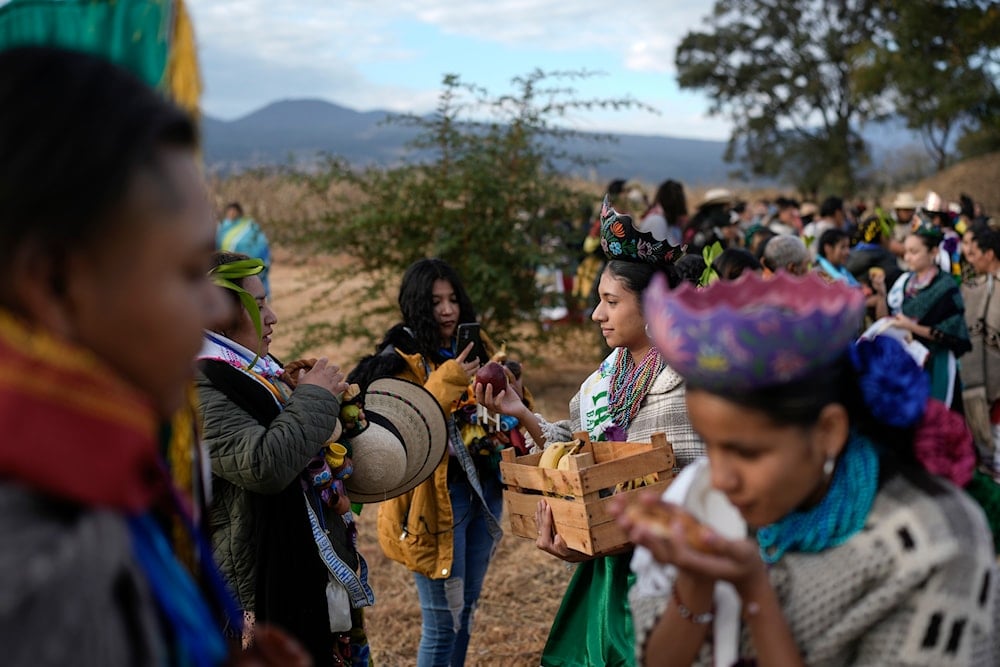Indigenous voices heard as Spain regrets colonial-era abuses
Spain’s foreign minister acknowledges historic injustices during the invasion of Mexico, marking a shift in tone amid ongoing calls for a formal apology.
-

Purepecha Indigenous people pass out fruit after holding a ceremony honoring the sun in Ocumicho, the morning after walking from Erongaricuaro with a flame their community had kept alive for one year in Michoacan state, Mexico, Thursday, Feb. 1, 2024 (AP)
Spain has formally expressed regret over the “pain and injustice” endured by Mexico’s Indigenous peoples during the country’s conquest of the Americas, marking a notable softening of tone after years of diplomatic tension over colonial-era abuses.
The shift follows a long-running dispute triggered in 2019, when Mexico’s then-president, Andrés Manuel López Obrador, sent letters to King Felipe VI and Pope Francis calling on them to apologize for the “massacres and oppression” that accompanied Spain’s conquest.
At the time, Madrid reacted sharply, arguing that historical events from five centuries ago could not be judged “in the light of contemporary considerations.” Spanish officials said the two nations should view their shared past “without anger and from a shared perspective.”
On Friday, however, Spain’s Foreign Minister José Manuel Albares struck a more conciliatory note during the opening of an exhibition in Madrid dedicated to Indigenous women of Mexico.
“It’s a very human history and, like every human history, it’s had its light and its shadows,” Albares said.
“And there has also been pain – pain and injustice towards the Indigenous people to whom this exhibition is dedicated. There was injustice, and it’s right to recognise that today and to be sorry for that, because it is also part of our shared history, and we can neither deny nor forget it,” he further stressed.
Mexico welcomes Spain’s ‘first step’
The statement came just days after Mexico’s new president, Claudia Sheinbaum, renewed calls for Spain to apologize.
“We agreed with the letter that was sent by President López Obrador, and we are still waiting for a reply,” she said earlier this week.
Sheinbaum praised Albares’ remarks as a positive gesture toward reconciliation.
“It’s a first step and it speaks to the importance of what we’ve always said: that apologies ennoble governments and peoples,” she said. “It’s not humiliating, it’s just the opposite. Congratulations to the foreign minister of the Spanish government, particularly in this Year of the Indigenous Woman.”
A fraught shared history
The Spanish conquest of Mexico began in 1519, when conquistador Hernán Cortés led an expedition of several hundred soldiers into the heart of the Aztec Empire. Armed with steel weapons, horses, and firearms, technologies unknown to the Indigenous peoples, Cortés also forged crucial alliances with rival groups, who saw in the Spaniards an opportunity to break Aztec domination.
By 1521, the Aztec capital of Tenochtitlán, the site of modern-day Mexico City, fell after a brutal siege marked by famine, disease, and mass slaughter. The conquest dismantled one of the most sophisticated civilizations of the pre-Columbian Americas.
In its place, Spain imposed a colonial regime rooted in Catholicism, feudal landholding, and racial hierarchy. Indigenous peoples were forced into conversion and labor under the encomienda system, which effectively enslaved them under Spanish landowners and missionaries.
The introduction of European diseases, especially smallpox, decimated native populations. Some estimates suggest up to 90 percent mortality in the decades following conquest, transforming the demographic and cultural landscape of the continent. The colonial encounter gave rise to a complex mestizo identity, blending Indigenous and Spanish heritage but often under conditions of coercion and inequality.
Even after Mexico’s independence in 1821, the legacies of the conquest persisted in language, religion, art, and social structures. Tensions over historical memory continue to shape Mexico’s relationship with Spain today. Periodic calls for formal apologies from the Spanish Crown for colonial atrocities reflect the enduring wounds of conquest, as well as the broader struggle to reconcile pride in shared cultural heritage with the trauma of subjugation.

 4 Min Read
4 Min Read










